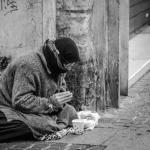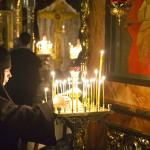This coming Saturday, June 15, is the feast day of Blessed Albertina Berkenbrock, whose story I discovered while researching my book of Catholic spirituality for adult victims of childhood sexual abuse, My Peace I Give You: Healing Sexual Wounds with the Help of the Saints.
Blessed Albertina, who was twelve years old when murdered in 1931, is known as a martyr of chastity. Her attacker killed her because she resisted his attempt to rape her.
Reading the saint’s biography on the Vatican website, I was disturbed to find that the writer implied Blessed Albertina was a saint because she was not violated—as though it were her physical integrity, and not her resistance, that made her a martyr of chastity. I knew that it was a wrong implication to make, because the constant teaching of the Church—from Augustine through St. Thomas Aquinas, and on to the present day—is that a virgin who is raped is still a virgin: not a “secondary virgin,” but a true virgin. (I have since discussed this topic in an interview aimed at shedding light on a much-misunderstood topic.)
In My Peace I Give You, I tell what happened when I discussed the Vatican website’s Blessed Albertina biography with an official from the Vatican’s Congregation for the Causes of Saints:
[The] erroneous idea that a rape victim cannot be a martyr finds its way even to the Vatican website. The site’s biography of another holy girl, Blessed Albertina Berkenbrock, who was killed while resisting an attacker, states, “Her reputation as a martyr was confirmed when the local midwife who had examined her body stated that the attempted rape was not a success.” No wonder the faithful are confused.
When I pointed out the claim in the Blessed Albertina biography to the Vatican official, he assured me the implication that a saint who was violated could not be a true martyr was “downright nonsense.” The problem, he explained, is that some of the website’s materials on saints are written by journalists who are not theologians.
“People do not always understand” what makes a saint a martyr of chastity, the official went on. “It is for this reason extremely important that these things are clarified. You can make this distinction by distinguishing clearly between bodily integrity and moral integrity.”
He explained to me that there are two aspects of virginity—physiological and moral. Moral virginity is in the intellect and will. “One can be physically violated and still be a virgin in the moral sense.” Since being raped does not involve consent of the will, holy people who were raped before being killed have done nothing worthy of reproach. “On the contrary,” the official went on, “if they tried to defend themselves [and were yet violated], they are in a privileged position…. They are martyrs in the truest possible sense.” In other words, far from being stained or impure, they are the heavenly witnesses who “have washed their robes and made them white in the blood of the Lamb” (Rev 7:14). [See another excerpt from My Peace I Give You on CNA.com.]
Although the Vatican website’s editors have yet to correct the biography (and the website does not show how to contact them), I am glad that a World Youth Day 2013 website, in sharing Blessed Albertina’s story, adds the sane observation, “There are many holy people who have [experienced] abuse and could not fight back”:
It is important to remember that Blessed Albertina is not considered a Saint solely because she fought back against an assault. Yes she is a martyr, but she was also beatified because during her short life, she developed a great sensitivity in her relationship with God and with the others. There are many holy people who have [experienced] abuse, and could not fight back. This does not mean that they are less holy, or that God loves them less, rather it means they are called to be witnesses of Christ’s suffering in a different way to Blessed Albertina. They are called to be Saints by their heroic example – and they really are incredible examples of how to be strong in what can be an unjust world. [See full article at XT3.com.]
* * *
If you would like to learn more about the message of My Peace I Give You, watch EWTN’s “Women of Grace” with Johnnette Benkovic next week, as I will be speaking about the book on that program every weekday from June 17 through June 21. Check your local listings for times and channels via EWTN.com, where you can also watch the programs via livestream. More information about My Peace is also available on my personal blog, The Dawn Patrol, which includes my tour dates.















